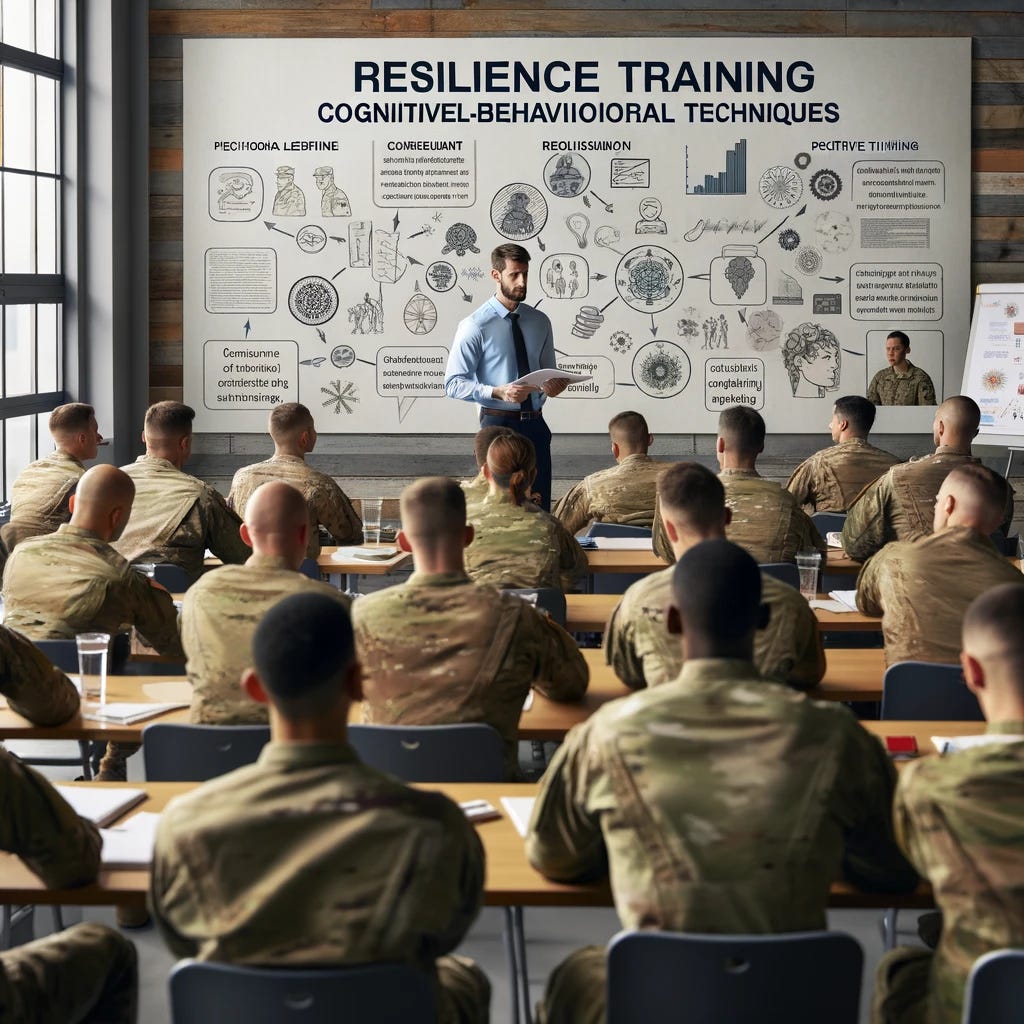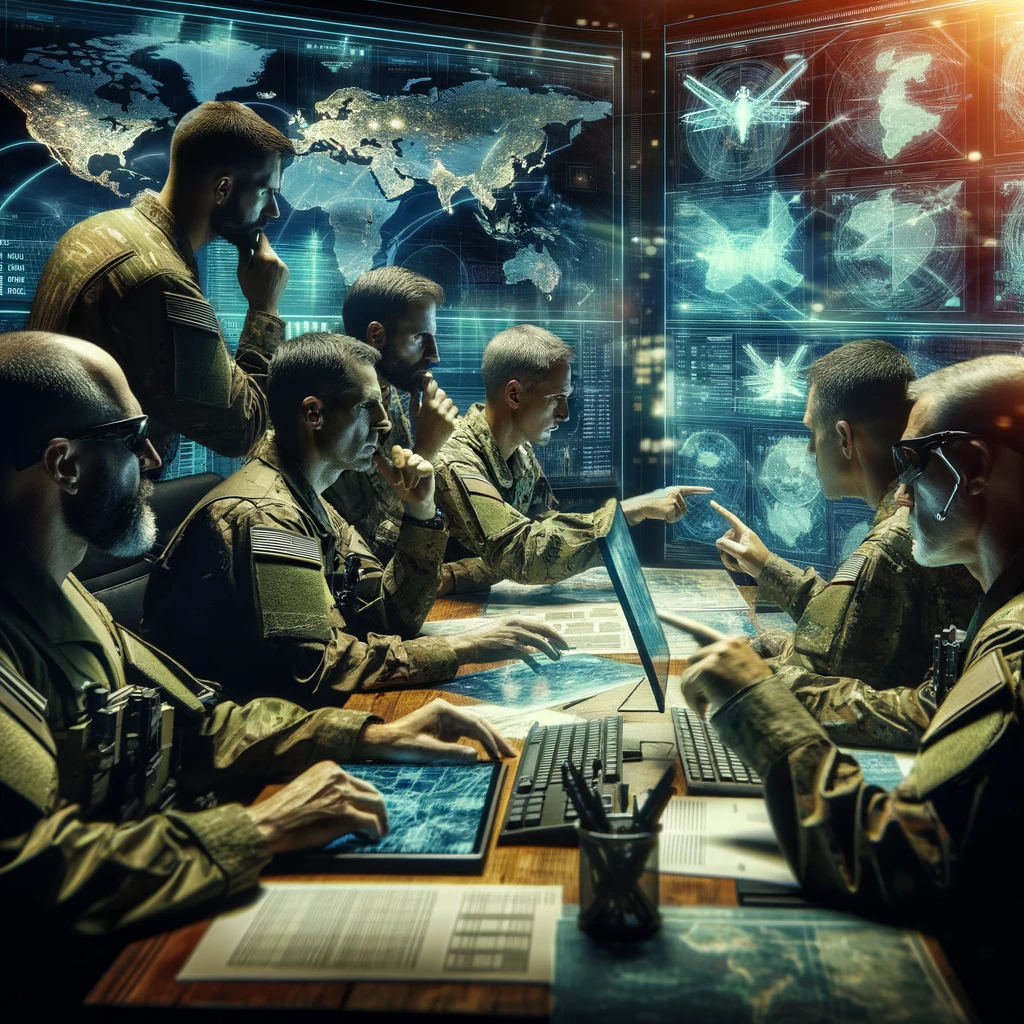Cognitive Resilience in High-Stress Military Operations: Strategies and Implications

Understanding Cognitive Resilience in Military Contexts
Cognitive resilience is the capacity of a person to handle and adjust to situations that are highly stressful with effectiveness, especially in demanding settings such as those generally found within military operations. This idea is of exceptional importance when considering the context of the military because the individuals serving in the armed forces are repeatedly subjected to harsh conditions where they must act fast in deciding, maintain a prolonged attention span, and demonstrate consistent emotional balance. This means that in the midst of intense scenarios, where the stakes are often high and the pressure to perform is constant, military personnel need to have a particularly strong mental fortitude. They are required to think on their feet, sometimes making life-altering decisions within seconds, while also keeping a level head to manage the emotional strains that such environments invariably present. The ability to stay mentally agile and composed is not just beneficial but essential for success in such roles. Therefore, fostering cognitive resilience isn’t just an advantage; it’s a fundamental characteristic that’s necessary for those in the military to operate effectively under pressure, ensuring they can meet both the physical and psychological demands of their duties.
The Role of Training and Preparation
Effective and comprehensive training holds the utmost importance when it comes to nurturing a state of mental toughness and flexibility, commonly referred to as cognitive resilience. Personnel in military service are subjected to an intensive and challenging combination of both physical and mental preparation exercises. The primary goal of such training is to substantially improve their proficiency in handling stressful situations, to refine their skill set enabling them to make rapid and sound decisions when under severe pressure, and to preserve their concentration over the course of extended missions and operations which can be physically and emotionally draining. These well-structured training regimens typically encompass a variety of scenario-based drills that simulate real-life challenges they might encounter, a range of resilience-strengthening practices that aim to fortify their mental endurance, and a slew of techniques designed for conditioning their minds to adapt and thrive in the face of adversity that they are likely to confront in the field.
Strategies for Enhancing Cognitive Resilience
Mental Toughness and Emotional Regulation
Cultivating a strong mental fortitude and the ability to control one’s emotions play critical roles in establishing cognitive resilience, which is the capacity to adapt and thrive in situations that are mentally demanding. To build such resilience, various strategies are regularly employed, with mindfulness, meditation, and cognitive behavioral therapy being among the most prominent methods taught.
Mindfulness is a practice wherein individuals focus on being intensely aware of what they’re sensing and feeling in the moment, without interpretation or judgment. Meditation involves training the mind to achieve a mentally clear and emotionally calm and stable state, which can greatly benefit cognitive resilience. Cognitive behavioral therapy, often referred to as CBT, is a structured form of psychotherapy that aims to alter negative patterns of thinking or behavior that are behind people’s difficulties, and so change the way they feel.
Incorporating these techniques has become a common element within military training programs. Within the high-pressure situations often encountered by military personnel, where decision-making and emotional control are paramount, these practical approaches are vital. They empower individuals to effectively navigate stress, regulate their emotions in a disciplined way, and consistently maintain an optimistic and mentally strong outlook, no matter what challenges they might face. The adoption of these techniques extends beyond the military, proving beneficial across numerous high-stress professional domains, and even in daily personal life, confirming their broad relevance and effectiveness.

Physical Fitness and Nutrition
Maintaining good physical health and adhering to a nourishing diet are essential components in the development of a strong, resilient mind. When an individual’s body is well-maintained and functioning optimally, this foundation enhances their mental capabilities, enabling them to better manage stress and resist the adverse effects of exhaustion. Consuming a variety of foods that provide all the necessary nutrients, engaging in consistent physical activities, and ensuring adequate rest are crucial practices that contribute to sustaining the highest level of mental function. A fit body is often accompanied by an alert and healthy brain, which together, improve an individual’s chances of dealing with demanding mental tasks. Ensuring that both physical and mental health are given equal importance paves the way for improved cognitive abilities, equipping individuals with the tools to effectively navigate and endure mentally challenging situations. This balanced approach of mindful eating, staying active, and getting enough sleep is indispensable in nurturing a sharp mind and upholding cognitive endurance.
Social Support and Team Cohesion
In the demanding context of military operations, the presence of social support and the unity of a team, known as team cohesion, play pivotal roles in establishing what is referred to as cognitive resilience. Cognitive resilience is essentially the mental fortitude required to deal with the intensive demands and stress unique to military engagements. The formation of robust, supportive bonds among the members of a military unit is essential in creating a supportive atmosphere. This kind of atmosphere is instrumental in mitigating the impact that the high levels of stress encountered during operations can have on an individual.
When the members of a team can communicate effectively, there is a significant positive effect on the team’s overall psychological well-being. The importance of nurturing a sense of brotherhood and mutual trust amongst soldiers is undeniable. When soldiers trust one another, they can work seamlessly as a single entity, thereby strengthening their collective resilience. This collective resilience is not just about the ability to recover from stress; it is about developing the capability to perform optimally under pressure.
Furthermore, when this camaraderie and trust are actively encouraged and cultivated within any military unit, they contribute greatly to the overall operational effectiveness of the unit. Units that can rely on each other and have strong internal relations are better equipped to handle the challenges that arise during the course of their operations. Hence, focusing on and investing in social support systems and team cohesion strategies is fundamental to enhancing the cognitive resilience and effectiveness of military operations. This focus ultimately leads to a higher likelihood of mission success and the well-being of the personnel involved.
The Impact of Technology and Innovation
In today’s world, the continuous progress in technology and creative new approaches are fundamentally altering the way cognitive resilience is addressed within military contexts. The integration of wearable gadgets that have the capability to track and record physiological responses is a prime example of this shift. These devices help monitor vital signs and stress levels in real time, providing valuable data that can be used to assess and improve the cognitive fortitude of military personnel.
Moreover, the use of virtual reality is another innovative tool that is reshaping the training environment. Through virtual reality simulations, service members can experience and adapt to stress-inducing scenarios in a controlled setting, which is known as stress inoculation. This method allows them to build mental resilience by being exposed to challenging situations and learning to navigate through them before facing actual high-pressure environments.

Artificial Intelligence also plays a pivotal role in this era of transformation. AI-driven tools are emerging as pivotal resources for mental health support; these sophisticated programs can offer real-time assistance and feedback, analyze behavioral patterns, and even predict potential psychological stressors before they become major issues. By employing these AI applications, military organizations can provide their personnel with more personalized and proactive mental health care, thereby reinforcing cognitive resilience.
All these examples underline the increasing importance being placed on leveraging cutting-edge technology to strengthen the mental and emotional stability of those serving in defense roles. This focus on enhancing cognitive resilience through tech-based tools not only aids in preparing military members for the rigors of their duties but also supports their overall well-being and long-term mental health.
Coping with Post-Traumatic Stress Disorder (PTSD)
Focusing on Post-Traumatic Stress Disorder (PTSD) and associated mental health concerns is paramount when considering cognitive resilience in individuals. The ability to bounce back from psychological stressors hinges significantly on taking appropriate and timely steps toward intervention. This includes prioritizing immediate attention and care for those experiencing the early signs of PTSD, which can greatly improve the outcome for recovery.
Ensuring that access to mental health resources is readily available is another foundational component in the support structure for individuals grappling with such challenges. These resources should be within easy reach, providing the necessary tools and professional guidance needed for managing and overcoming the effects of traumatic experiences.
Furthermore, it is crucial to change the way mental health care is viewed in the context of the military. The aim should be to remove any negative connotations around seeking help for mental health issues, thereby encouraging more service members to come forward and receive the help they require without fear of judgment or reprisal. Working toward a culture that promotes mental well-being as much as physical fitness is essential.
Providing tailored treatment plans that cater to the individual needs of those affected by PTSD is another pivotal aspect of fostering recovery and promoting resilience. Recognizing that each person’s experience with PTSD is unique ensures that the care offered is specifically designed to address their particular challenges.
Continued support is integral to the healing process, helping individuals to not only regain their previous levels of functioning but also to develop stronger cognitive resilience. This support can come in many forms, from therapy and medication to peer support groups and community services, all contributing to a comprehensive approach to mental health care.
By taking these sensitive and proactive steps — early intervention, ensuring access to mental health resources, eliminating the stigma attached to mental health care in the military, and providing personalized and ongoing support — we position ourselves as a stronger, more compassionate society capable of aiding those affected by PTSD in their journey towards a resilient and healthy future.

Leadership and Cognitive Resilience
Effective leadership is incredibly important and serves as the cornerstone for nurturing a strong sense of cognitive resilience among the members of military units. When leaders consistently show understanding and compassion, pair that with the ability to convey their thoughts and instructions clearly, and maintain their composure to make informed decisions even when faced with high-stress situations, it has a profound impact on the overall resilience of their teams. For these reasons, it is vital to have leadership development programs that are carefully designed with an emphasis on cultivating these specific skills. Such programs are fundamental in the process of developing military leaders who can demonstrate resilience and guide their teams through challenging situations. These programs not only aim to enhance the individual capabilities of military personnel in leadership roles, but they also strive to strengthen the collective ability of the team to endure, adapt, and overcome any adversities they may face. By investing time and resources into these specialized leadership development programs that accentuate empathy, effective communication, and decisive action under pressure, military organizations can ensure that their units are better prepared for the psychological demands of their duties and are lead by individuals who are not only strategic and tactical in their approach but also supportive and adaptive at every level.
Cultural and Ethical Considerations
Awareness and respect for cultural differences, alongside ethical thinking, are becoming more widely acknowledged as crucial elements when it comes to fostering cognitive resilience. Gaining an in-depth understanding of and showing respect for the varied cultural heritages that military personnel bring to the table, can significantly improve how effectively team members work together and support one another. In turn, this collaborative spirit contributes greatly to the collective resilience of the group. In stressful situations, the ability to make decisions that are ethical and sound is another cornerstone of cognitive resilience. This capacity doesn’t come naturally but is the result of diligent, ongoing training that emphasizes the value of ethics and strengthens situational awareness. Both cultural sensitivity and ethical decision-making skills are therefore essential, and they must be cultivated consistently to ensure that individuals and teams can bounce back and thrive even under challenging circumstances.
Future Directions in Cognitive Resilience Research
Exploring future pathways in the study of cognitive resilience is critical to deepen our comprehension and enhance our response tactics. There’s a significant emphasis on examining the underpinnings of cognitive resilience that operate at a neurobiological level. Moreover, recognizing the psychological tactics that can be employed to bolster such resilience is a dynamic area of scholarly focus. Also of high interest is the pursuit of knowledge regarding how enduring stress exposure can potentially deteriorate an individual’s cognitive capabilities.
As we press on with these investigations, it’s important to continuously probe and understand the biological and psychological elements that can help individuals maintain cognitive function in the face of stress and trauma. An understanding of cognitive resilience stretches across multiple research domains which include pursuing studies that dissect brain behaviors and mechanisms at their core, to implementing therapeutic interventions aimed at improving mental robustness.
The success of this research relies heavily upon the strong cooperative relationships forged between different domains of expertise. Military bodies, renowned for their interest in the resilience of their personnel, are at the forefront of funding and supporting research alongside universities and other centers of educational excellence. Furthermore, the insights and practical knowledge contributed by mental health experts are invaluable, as they translate research findings into applicable strategies for enhancing cognitive resilience.

This collaborative work is the cornerstone of ongoing efforts and serves as a bridge connecting theoretical research with practical, real-life outcomes that benefit not only servicemen and women but also society as a whole. It fosters a multidisciplinary approach to research and underscores the multifaceted nature of cognitive resilience.
Conclusion
In the final analysis, the concept of cognitive resilience, especially when considering the intense pressures found within military operations, emerges as a complex and continuously evolving discipline. It is imperative for military units to adopt a comprehensive strategy that encompasses a variety of aspects including rigorous training regimens, the latest technological advancements, robust mental health support systems, and the fostering of ethical leadership at all levels. Such a multifaceted strategy would serve to significantly bolster the mental agility and psychological stamina of the armed forces personnel. Delving further into this matter, there is an undeniable necessity for ongoing exploration and pioneering advancements in this particular sphere. This relentless pursuit of knowledge and practical solutions is vital for ensuring the welfare and operational efficiency of soldiers who regularly encounter highly demanding and stressful situations in their line of duty. The future success of military personnel, faced with the rigors of complex and daunting missions, will largely depend on how well these cognitive resilience enhancing measures are implemented and adapted over time.
Dr. Jerry D. Smith Jr. is a clinical psychologist and empathic expert specializing in human empowerment and leadership.
More from Dr. Jerry Don Smith Jr. and Operational & Defense Psychology Review






